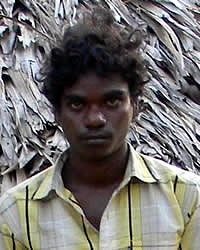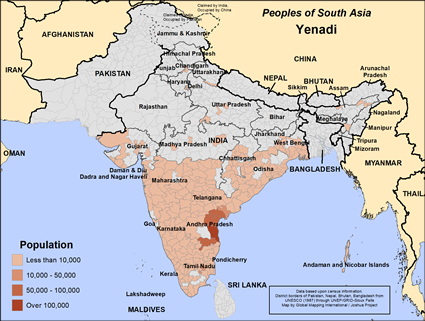Yenadi in India

Photo Source:
John Kless
|

Map Source:
People Group data: Omid. Map geography: UNESCO / GMI. Map Design: Joshua Project.
|
| People Name: | Yenadi |
| Country: | India |
| 10/40 Window: | Yes |
| Population: | 707,000 |
| World Population: | 707,000 |
| Primary Language: | Telugu |
| Primary Religion: | Hinduism |
| Christian Adherents: | 0.81 % |
| Evangelicals: | 0.40 % |
| Scripture: | Complete Bible |
| Ministry Resources: | Yes |
| Jesus Film: | Yes |
| Audio Recordings: | Yes |
| People Cluster: | South Asia Tribal - other |
| Affinity Bloc: | South Asian Peoples |
| Progress Level: |
|
Introduction / History
For many years, the Yenadi people lived in isolation on the island of Sri Harikota, off Andhra Pradesh's Nellore district. In 1835, the British government took possession of the island. The British opened schools and industries to try to "civilize" the Yenadi people by showing them a more modern way of life. These efforts were not successful. The Yenadi people are among what the Indian government calls the "scheduled tribes. " Because scheduled tribes are underdeveloped economically, the Indian government has attempted to bring them into the mainstream of political and economic life. These tribes were "scheduled" for special treatment. The Yenadi are now located in Andhra Pradesh in southern India. They live primarily in the districts of Nellore and Chittoor, as well as other nearby districts. They speak Yanadi, which belongs to the Telugu language family. There are four Yenadi clans.
What Are Their Lives Like?
The Yenadi people have a history of being exploited by crooked money lenders leaving them in debt peonage. They are news articles about people trying to help the Yenadi people get their basic needs met. For example, there is public housing for them. Another group is trying to make sure Yenadi children are able to complete their education. Child marriage has been a problem in the past, and the Indian government is finding ways to keep them from this practice that usually leads to a life of poverty. Finally, there is an effort to legally help the Yenadi people recover their land from those who exploit them. This is especially important since land ownership means the difference between poverty and having needs met. When they don't own the land, they wind up working for others, often only being paid with scraps of food. Though they are best known as farm hands, some fish and catches frogs. Others search the forests for goods they can sell.
What Are Their Beliefs?
The Yenadi are nearly all Hindu. They have pictures of their gods in their homes and small shrines are usually located in each village. Every year they have festivals in worship of their favorite gods. These gods supposedly favor some and dislike others, depending on how they performed a ritual. Good luck and fate are important to the Yenadi. They believe that charms, amulets, and "lucky people" generate good fortune.
What Are Their Needs?
The Yenadi people need better schools and hospitals. Perhaps Christian teachers and medical workers can open doors to reach the Yanadi.
Prayer Points
Pray for gospel workers to catch a vision for reaching the Yenadi people for Jesus and that in God's sovereign timing their hearts would be open and ready to follow him. Pray for Jesus movements to bless extended families so the gospel will spread rapidly among this people group. Pray for the spiritual lives of the Yenadi people to become fruitful as they follow Christ. Pray for the lives and culture of the Yenadi people to evidence the rule and reign of the Kingdom of God as they open to the gospel, and for the beauty of Jesus to be seen in them.